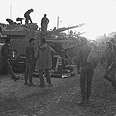
Militarily, Israel won Yom Kippur War; psychologically, we lost a slow and creeping defeat
צילום: לע"מ
The children of winter 1973
Op-ed: Post-Yom Kippur War Israel is a country which has abandoned concept of solidarity in favor of sanctifying individual
The children of the winter of 1973 are already 40 years old. Their generation, which is also my generation, was born into the remorse, into the national trauma. What happened then has an effect to this very day.
The Israeli discourse tends to attribute to the Six-Day War a mystical power of change. A sort of turning point, after which nothing seemed the same anymore. From an external point of view that's true. The change following the 1967 war is conspicuous: Israel grew, added territories, expanded political disputes. From an internal point of view it's just an illusion. The war was simply another stage in the medical miracle called the State of Israel. The big change took place only six years later, in the Yom Kippur War.
Wars are measured by their results: Military achievements, number of casualties and diplomatic products. Time is the best measuring instrument. What sometimes appears as defeat turns into victory years later. And there are also victories which turn, with considerable persuasion efforts, into defeat. History remembers what strong writers want us to remember, not necessarily strong facts.
Militarily, despite the national memory and the exaggerated tendency for self-flagellation, Israel won the Yom Kippur War. From a surprise attack on two fronts, with lacking intelligence and many casualties, the IDF moved to a sophisticated offensive and concluded the war with Damascus and Cairo in jeopardy. History is too hard on the fighters and politicians of the time.
Psychologically, on the other hand, we lost a slow and creeping defeat for the past 40 years. It is not the occupation from 1967 that is destructive, but the fervent skepticism which grew within us in 1973. Post-Yom Kippur War Israel is a country with doubts, a country in which the question is holier than the answer.
The substantial change lies there, in the seeds planted at the time in the Israeli discourse.
The children of the winter of 1973 were born into a country where there is no faith in the leadership, because one must never follow politicians blindly. A country where one must not talk about victory and decision, because in the battlefield there are only losers and commissions of inquiry. A country where in order for one not to become – God forbid –overly patriotic, military parades disappeared from the street and cultural heroes evade military service. A country where soldiers have been turned by everyone into small children who must be protected, and for whom a heavy price must be paid when they are taken captive, while the life of the citizens for whom the army was established has turned into a tolerable price.
And mostly a country which has put an end to the concept of solidarity, and instead sanctifies the individual. No longer a melting pot, according to Ben-Gurion's vision, no longer a new Israeli, but words like multiculturalism and diversification, which have factionalism hiding behind them.
In the 40 years which have passed since the Yom Kippur War, the State of Israel's situation has increasingly improved. The Israeli economy grew stronger, Israel leads in the fields of science and technology, Jews immigrated from around the world, education is better and the standard of living is higher. As a state, Israel no longer faces a threat of destruction and annihilation, as it did in October 1973, despite the concerns about Iran. Young people in uniform, unfortunately, still die in this country, but the country itself is living, breathing and solid.
We have developed in all fields, we're just stuck with the psychology. We have overcome the war, but not the price of its self-examination.










